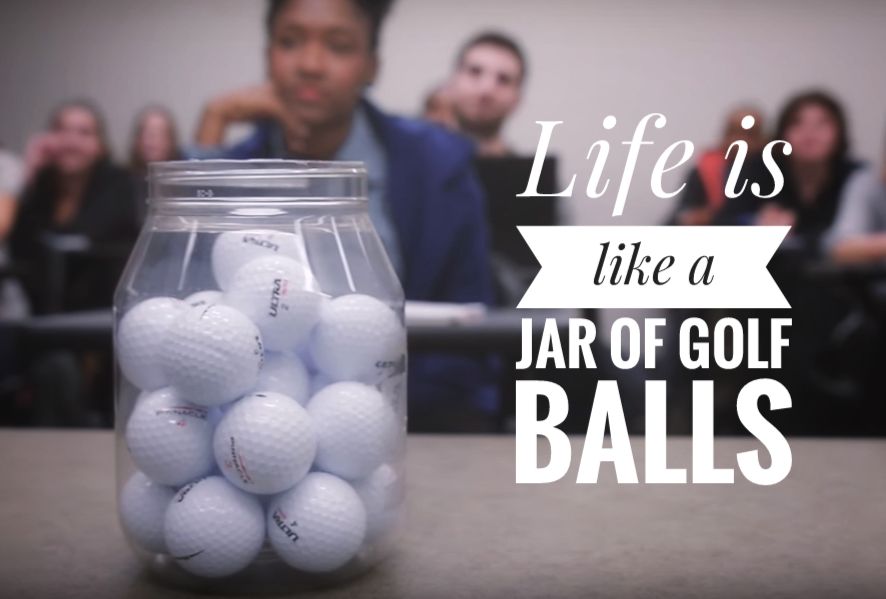Here is an apocryphal story for you. Its veracity may be questionable, but its impact and utility are not.
A university professor enters a classroom full of students carrying a box which he puts on the floor. He pulls a large glass jar out of the box and puts it on his desk. Then he reaches back into the box and pulls out a bag of golf balls which he proceeds to pour into the jar, right to the top.
“Is the jar full?” he asks his class.
“Well, yes, it’s full.”
Reaching back down into the box, the professor emerges with a bag of pebbles. As he pours them into the jar, they fill in the gaps between the golf balls until the bag is empty.
“Is the jar full now?”
“Yes, it’s definitely full now!”
But the professor isn’t done. Out comes a bag of sand which is emptied into the jar, filling in the gaps around the pebbles, all the way up to the brim.
“I think you see the pattern. Is the jar full now?”
The students hesitate.
“Yes . . . ?”
Finally, the professor pulls out two bottles of beer, opens them and – much to the students’ dismay – empties them into the jar. Then he looks up at the class.
“This jar is your life. The golf balls are the big things that you really care about. The sand is all the other stuff that we try to fit in.” He pauses.
“Now, what would happen if we filled the jar with sand first?”
Understanding washes over the students. “There would be no room for the golf balls . . .!”
The professor explains: “So, the problem is this: If we’re not intentionally prioritizing our values, our lives will quickly fill up with a thousand other things that don’t matter, leaving no room for the things that do. Think about what your golf balls are and put them first.”
As the students ponder this little bit of wisdom, one puts up his hand.
“What about the beer?”
“The beer? Well, no matter how full your jar is, there’s always room for a couple of beers with a friend, right?”
Golf balls vs. sand
I like this story because I know myself well enough to know that 1. Sometimes I have a hard time telling the difference between golf balls and sand, and 2. I need a reminder to put my golf balls in the jar first.
This story reminds me of a great book with an unforgettable title that I read years ago and keep coming back to. If you’ve been to my “Favourites” page, you would have seen it there – Mark Manson’s “The Subtle Art of Not Giving a F*ck”. Equal parts self-deprecating, hilarious, and wise, Manson contrasts a life of sand – saying “yes” to everything leads to hollowness, exhaustion, and unfulfillment – vs. a life of golf balls – investing our time, energy, and money on those few things that excite us and drive us to be better human beings. And then he gives us permission, encouragement even, to “not give a f*ck” about all the rest.
Golf balls first
I need that advice repeated on a fairly regular basis. Some people fill their lives with Netflix, Facebook, cable news, or video games – and I lack immunity to many of those myself, but my biggest weakness is that I find so many things interesting and exciting that I am constantly at risk of taking on so many projects that they don’t remain interesting and exciting because I’m just too busy to enjoy them.
Apparently, I am easily fooled by sand that is moulded into golf-ball shapes.
A few weeks ago we moved houses. There are a million things to do and they all seem important. But as a husband and a father, I have to remember that my first obligation is to my wife and kids, not my “To Do” list. Everything else will just have to fit in the spaces between what my family needs from me. At the end of these long days, that is the only approach that leaves me feeling satisfied.
What does this have to do with finance?
For me this metaphor provides two big takeaways with respect to money. The first is philosophical and the second is practical.
A question I frequently come back to is: What is the purpose of your money?
Money pervades our lives. The average person makes six to eight financial decisions every day. But what is the point of money? I would argue that money’s greatest purpose, its most noble use, is to serve our values – i.e. spend money on your golf balls.
In “I Will Teach You To Be Rich”, Ramit Sethi encourages people to spend lavishly and unapologetically on those few things that truly bring them joy while being thoughtfully frugal with all the rest. If fancy cars and the latest technology don’t provide you with lasting happiness – and they rarely do – buy used cars and coast with old tech until it bites the dust.
There are a million types of sand vying for your dollars: premium brands, services of convenience, and doo-dads that promise to make your life better. But every dollar you spend on these things is a dollar not spent on those things that truly matter – your golf balls.
Identify your golf balls, put them in the jar first, and prioritize your spending accordingly.
Prioritizing information
Just like we can get distracted by our spending, we can also get distracted by information. This is the second big takeaway from the jar of golf balls metaphor.
Personal finance is a problem to be solved; how best to earn, grow, and protect wealth. We address this problem just like any problem – by making decisions based on information. But what information?
An avalanche of biased, misleading, inaccurate, and incomplete content awaits the indiscriminate. Filtering the signal from the noise is particularly challenging when the purveyors of the information stand to gain from your attention. In finance, skepticism is a virtue.
What are your financial decisions based on?
Do you have a tendency to base investment decisions on trends? – mining stocks, cannabis, crypto, big tech?
Do you have a hard time pulling yourself away from the talking heads on BNN with their analyses and predictions?
Do you still think you can tell what the market is going to do over the next 6 – 12 months?
I would argue that all of this is sand in your jar.
When it comes to personal finance and wealth management, it’s easy to fill our jars with the noise of “expert” analysis and predictions that have been shown time after time to be fruitless and inaccurate. If your jar is your financial toolbox, fill it first with the basic skills and knowledge that proven to work:
- Save at least 10% of your income while working
- Ensure you are adequately prepared for known risks (insurance and wills)
- Track your spending in retirement to make sure your money lasts
- Follow a simple, evidence-based investment plan like dividend investing or indexing
Reading those bullets might put you to sleep, and that’s part of why this is hard: the useful information is boring and the useless information is exciting. But that doesn’t change the fact that the most effective path to financial independence is paved with diligence and resilience rather than thrilling predictions and impressive complexity.
Despite the “Beating the TSX” moniker of the strategy I write about on this site, good investing is really not about beating the index at all. As Benjamin Graham says,
“The best way to measure your investing success is not by whether you’re beating the market but by whether you’ve put in place a financial plan and a behavioural discipline that are likely to get you where you want to go.”
Life is like a jar of golf balls. And so is personal finance.
I hope you’re enjoying your summer.
Thank you so much to those of you who have chosen to support me and this blog with your donations. Yyou can support this site by clicking here:





Matt,
Thank you so much for this great article that I can’t wait to share with my kids ( 20yo and 18yo) .
Congrats on the house , Moving is the least favorite thing that I would like to do in my life but I know how excited were my wife and kids when we moved to out new place 3 years ago 🙂
Hope you’re enjoying the summer as well.
Thanks, Gus! Moving sucks, but the new house and location are worth it, especially because there are far better academic and extracurricular opportunities for the kids here vs. the small town we moved from. Hopefully, we will be here for a good long time!
Thank you Matt, I always enjoy and learn something from your blog posts. I have a couple of general questions that you may be able to offer some guidance on.
1. I have a diversified portfolio of good Canadian and US stocks picked and managed by a professional Portfolio Manager. I have been religiously tracking the BTX portfolio vs. my Canadian portfolio for 19 months, over which time we have experienced both a strong bull market (in 2021) and a pretty good downturn (in 2022). Simply stated, the BTX is beating my “professionally managed” CDN portfolio by a sizable margin, excluding the fees paid to manager, which of course makes the margin even greater. I would like to switch to a self managed BTX model. The problem is if I sell my current stocks, to switch to the BTX model, I will trigger capital gains. I feel like I’m trapped. Suggestion?
2. Is there a BTX type model for US stocks?
Hi Gary, thank you for the kind words. To your questions . . . First, tax considerations generally come second to good investment decisions – i.e. even when an initial tax-hit is involved, the sooner a low/no fee evidence-based approach is adopted, the better off one is, in general. Having said that, I would never give individual advice without knowing someone’s whole financial picture – unfortunately, not possible in this forum, but send me a message if you’re interested in my mentoring/planning service.
Re: your second question, “Dogs of the DOW” is the US equivalent of BTSX.
Hope that helps.
Thank you for the reply Matt. Please tell me a little more about your “Mentoring/Planning Service”. What’s offered, what information is needed, cost, etc.
Gary
It can all be found on my “Work with me” page here: https://dividendstrategy.ca/work-with-me/
Hi Matt,
Congratulations on your new home and all the excitement that comes with new beginnings!
The golf ball jar is fantastic advice to live by for all. To bad most wont pay attention until it’s by them but it’s never to late to make changes.
We are living in a time where misinformation takes hold over us with social media etc.
I like simplicity and boring myself.
Thanks for continuing your wonderful work on this site.
Cheers
Thanks, Bruce. The great thing about simplicity is that it’s actually more effective than complexity anyway. I’m currently working on a post about crypto. Spoiler: there is potential, but it’s a great example of a dangerous double-whammy of complexity and misinformation.
This is such good advice. I just find it hard to identify what my golf balls are. But will continue to work on.
Investing is best kept simple. Your advice for Gary is right on, move to self directed as soon as possible.
Thanks for stopping by, DivInvestor. I think a lot of people are a little confused as to what their golf balls are – and often too busy to sit down and reflect on it. At least, that was the case for me. One of the biggest benefits of taking a year off to travel in 2018 was it gave me physical and mental space to slow down and sort through some of my own issues.
Hi, Matt,
Great article, I have been following your blog since early this year, and switched portions of my portfolio to BTSX. I enjoy reading your articles, particularly related to philosophical and emotional side of investing. I do think that to achieve success in investing requires one fully understanding him/herself first, (risk tolerance, goals and management style), once this part of inner work is done, the external work (choosing investment strategy and style) becomes relatively easier. Personal finance is “Personal” first, then “Finance” second.
Congratulations for the move, and wish you a great beginning in life. (We have moved to a new place less than 2 years ago, we embraced the new chapter in life).
Angela
Like a lot of my readers, I find the technical side of finance very interesting – stats, numbers, analysis, etc. But I always come back to the more personal, philosophical, and psychological aspects because that is really what helps guide my actions in real life. Money is great, but what’s the point of money? I am constantly searching for a better, fuller answer to that question.
So eloquently told Matt. I read this twice and shared it with my family. We live in a world where it is so easy to fill our lives with the useless (sand) and have no room for the big things that really matter. True for so many things, including finances. This really resonated with me.
Great metaphor to live by. Thank you for sharing.
Thanks so much for this comment, Sil.